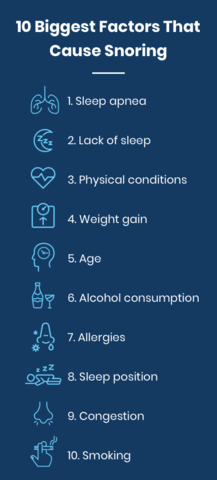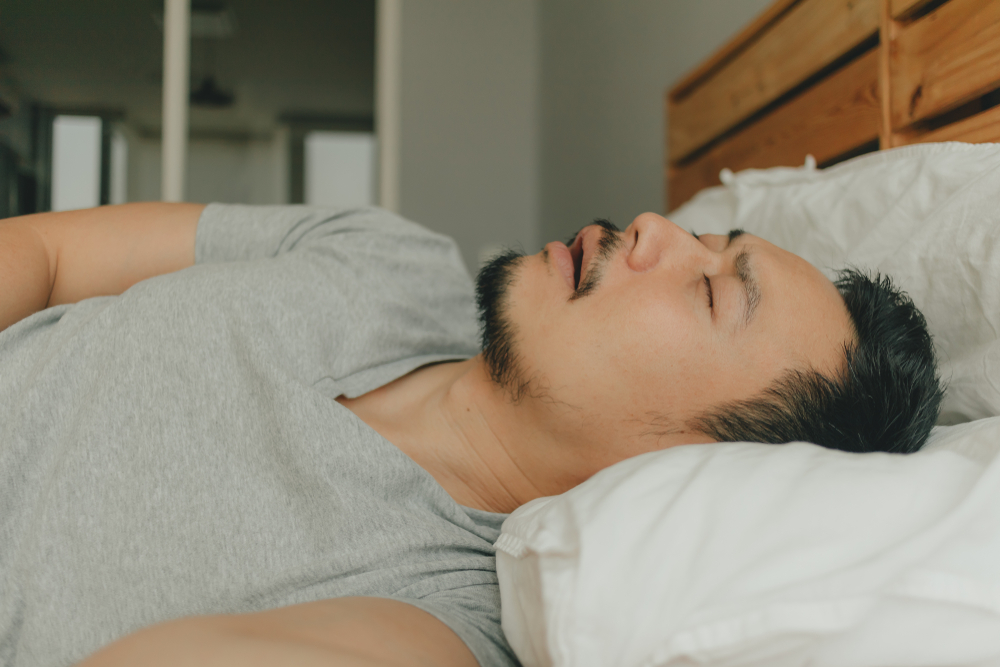What Causes Snoring? 10 Reasons for Snoring

Why Do People Snore? 10 Causes of Snoring
If snoring keeps you or your partner up at night, it can leave you feeling groggy and irritated, and even cause a rift in your relationship. The effects of snoring can be far-reaching—from impacting your health and personal life to interfering with your professional performance. For those very reasons, you’re likely curious to find a solution for your snoring.
If you’re ready to say enough is enough, learn more about the reasons for snoring and how you can stop it to get the peaceful night’s sleep you deserve.
- Why Do People Snore: The Reasons for Snoring
- Causes of Snoring: The 10 Biggest Factors That Cause Snoring
- Snoring & Sleep Apnea: Know These Key Differences
- How to Stop Snoring: Snoring Remedies to Start Today
Why Do People Snore: The Reasons for Snoring
If you’re desperate to get to the bottom of your burning questions such as “What causes snoring?” and “Why do I snore?”, you need to first understand the reason behind snoring. While it might just seem like poor luck of the draw, there are actually processes within the body that are occurring and effectively causing your mid-sleep roars.
So, why do people snore? Well, it comes down to a few key reasons:
- Relaxed muscle tissue has blocked the airway.
- Inflammation has caused tissue to block the airway.
- Abnormal development or injury within the airway has caused interference.
- There are actually 4 types of snoring: Nose, mouth, tongue, and throat. Snoring is mostly caused by loose tissue and/or partially blocked airways.
Check out our resources for more snoring facts, or continue reading to learn more about what causes snoring and discover how you can stop snoring from disrupting your sleep.
Causes of Snoring: The 10 Biggest Factors That Cause Snoring

There are a number of underlying factors that may be contributing to your nightly snoring. Certain habits or lifestyle factors can cause the throat muscles to become relaxed, which consequently causes the tissue to vibrate, creating the snoring noise. Some of the common underlying snoring causes include:
- Sleep apnea: Snoring is one of the more common symptoms of sleep apnea as this condition interferes with breathing while sleeping. Learn more about the relationship between sleep apnea and snoring in the next section.
- Lack of sleep: Believe it or not, a lack of sleep may be the culprit behind your noisy snoozing. When you’re short on sleep, your throat muscles become relaxed—blocking your airways and turning your breathing pattern into vibrating snores.
- Physical conditions: A deviated septum, oversized tonsils, a soft palate that is lower than usual, and other physical conditions can all be contributing factors to snoring as they disrupt regular airflow.
- Weight gain: When we become overweight, more tissue accumulates, including around the throat and neck. This additional tissue can add pressure to your airways, causing partial blockage and increasing your likelihood of snoring. For the same reasons, many women start snoring when they become pregnant.
- Age: As we grow older, our bodies change. This includes our throat and tongue muscles. When these areas lose muscle tone, they become more prone to vibrating as air attempts to come through the airway.
- Alcohol consumption: The sedative effects of alcohol can cause your muscles to relax, including those in your throat and neck. This is also the case with sedative medications.
- Allergies: Those who have allergies, whether they be seasonal or year-round, can experience inflammation of the nose and throat, which can reduce the size of the airway.
- Sleep position: Your sleeping position, specifically sleeping on your back, can make you more likely to snore because this position causes your tongue and soft palate to fall toward the back of the throat.
- Congestion: Colds or congestion caused by dry air can contribute to snoring because both dry out your throat tissues.
- Smoking: Similar to allergies, smoking irritates the tissues in your throat and nose, increasing your likelihood of snoring.
Snoring & Sleep Apnea: Snoring May Be a Symptom of Apnea, But Not All Snorers Have Apnea
Despite popular belief, snoring and sleep apnea are not the same condition. Sleep apnea is a sleep disorder in which an individual’s breathing is repeatedly interrupted while sleeping. Most people who suffer from sleep apnea suffer from obstructive sleep apnea (OSA).
This type of sleep apnea is caused by the muscles in the throat relaxing and obstructing the airway—hence its name. The other type of sleep apnea—central sleep apnea—occurs when the brain fails to send signals to the muscles that control breathing, causing breathing to start and stop in random intervals.
That said, snoring can be a sign of sleep apnea—more so for people with OSA. If you have reason to believe that your snoring is caused by sleep apnea, it is important that you seek treatment as soon as possible. It’s important to note that OSA, not just snoring alone, can have negative effects on your health by increasing your chances of high blood pressure, stroke, and depression.
How to Stop Snoring: Snoring Remedies to Start Today
If you can pinpoint the most likely cause of your snoring, you may be able to eliminate the issue in one fell swoop. However, if you’re still not able to definitively answer the question “Why do I snore?”, then it may be a process of trial and error.

Depending on the severity of your snoring and the impact it’s having on your life, you may want to consider different solutions ranging from mild to high-commitment options. Here are a few easy changes you can try:
Simple Sleep Adjustments
Sleep on Your Side
Instead of sleeping on your back, try sleeping on your side to alleviate snoring. If you have a habit of sleeping on your back and find it hard to break, try putting pillows around your body to help prevent unconscious turning-over in your sleep. It may take some getting used to, but once you adjust you’ll likely enjoy a much more peaceful sleep.
Use a Humidifier
Your snoring may be caused by congestion or dryness in the air. To combat this problem, try sleeping with a humidifier. Humidifiers are machines that increase the amount of moisture in the air for a more balanced indoor environment.
Get your 7-9 Hours
If you’re like most people, running on minimal sleep is the norm. However, experts recommend that adults get approximately 7 to 9 hours of sleep each night. If you’re not getting 7 to 9 hours of quality sleep, you may need to make some adjustments to your sleep routine. Check out the SleepScore app for an in-depth analysis of your nightly sleep quality.
Lifestyle Changes
Weight Loss
If you’ve recently started snoring out of the blue, it may be due to weight gain. Revisiting your fitness routine to manage your weight may help resolve this issue. For some, more significant weight loss may be necessary to stop snoring completely. If you’re unsure, consult your doctor to see what kinds of solutions might work for you.
Reduce Alcohol Consumption & Smoking
Since alcohol consumption can contribute to snoring, it’s best to avoid it when you can—or at the very least, limit drinking on certain days. Similarly, smoking-related snoring can be prevented by kicking the habit altogether—it can also lower your risk of other health issues.
Treatments
If your snoring happens nearly every night or is severely disrupting your sleep, you may want to try one of the following proven treatments that can help minimize your snoring and symptoms. There are a variety of sleep position trainers, nasal dilators, and snore pillows that may be a big help, too.
Wear a Snoring Mouth Guard
Mouth guards for snoring can be worn at night to help keep your airway open while sleeping. It’s recommended that if you do decide to wear a snoring appliance that you get one that’s custom-fitted to your bite for the best results.
Surgery
If your snoring is caused by an abnormality in the anatomy of your mouth or nasal passage, you might consider undergoing surgical reconstruction to correct the issue. If you believe this is the case for you, be sure to consult an expert first. This is considered a last resort for solving snoring, but a more common consideration for apnea treatment.
Sleep Apnea Treatment
If you are diagnosed with OSA, a doctor may recommend an oral appliance, CPAP machine, or other sleep apnea treatment that can improve your condition.
Now that you have a better understanding of what causes snoring and how it can be stopped, you can look forward to more peaceful sleep and all the benefits that come along with it.